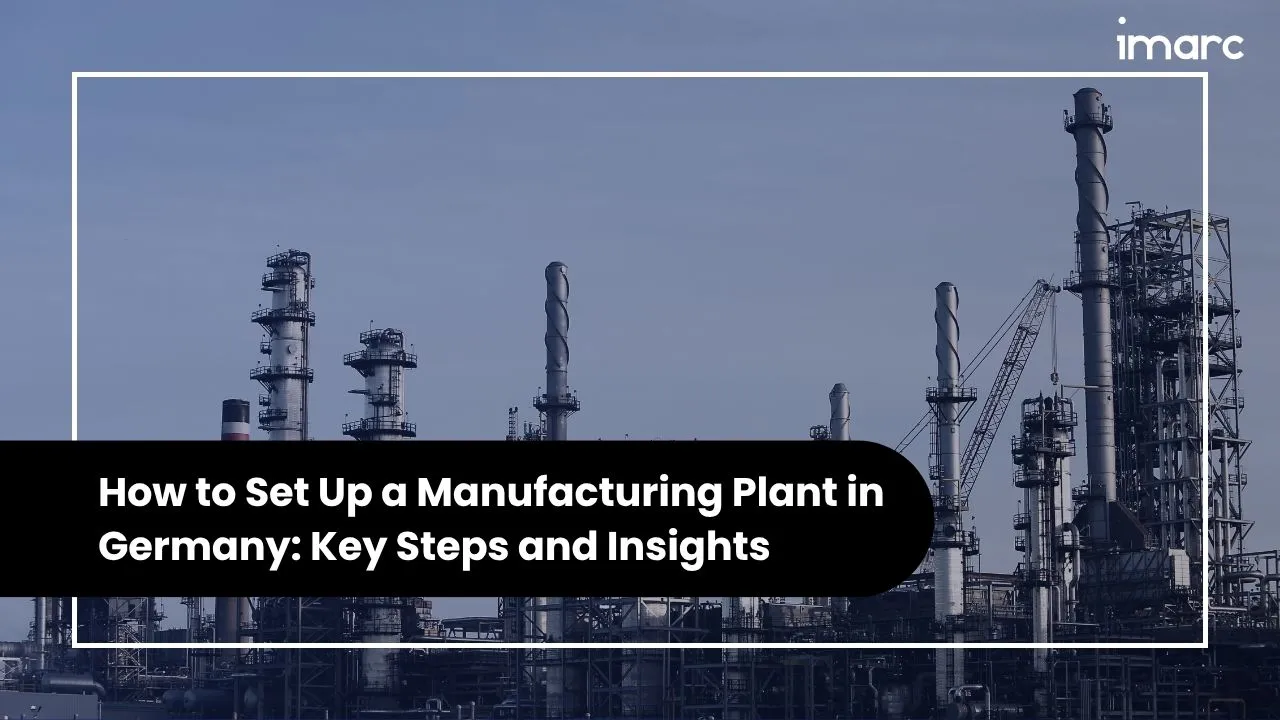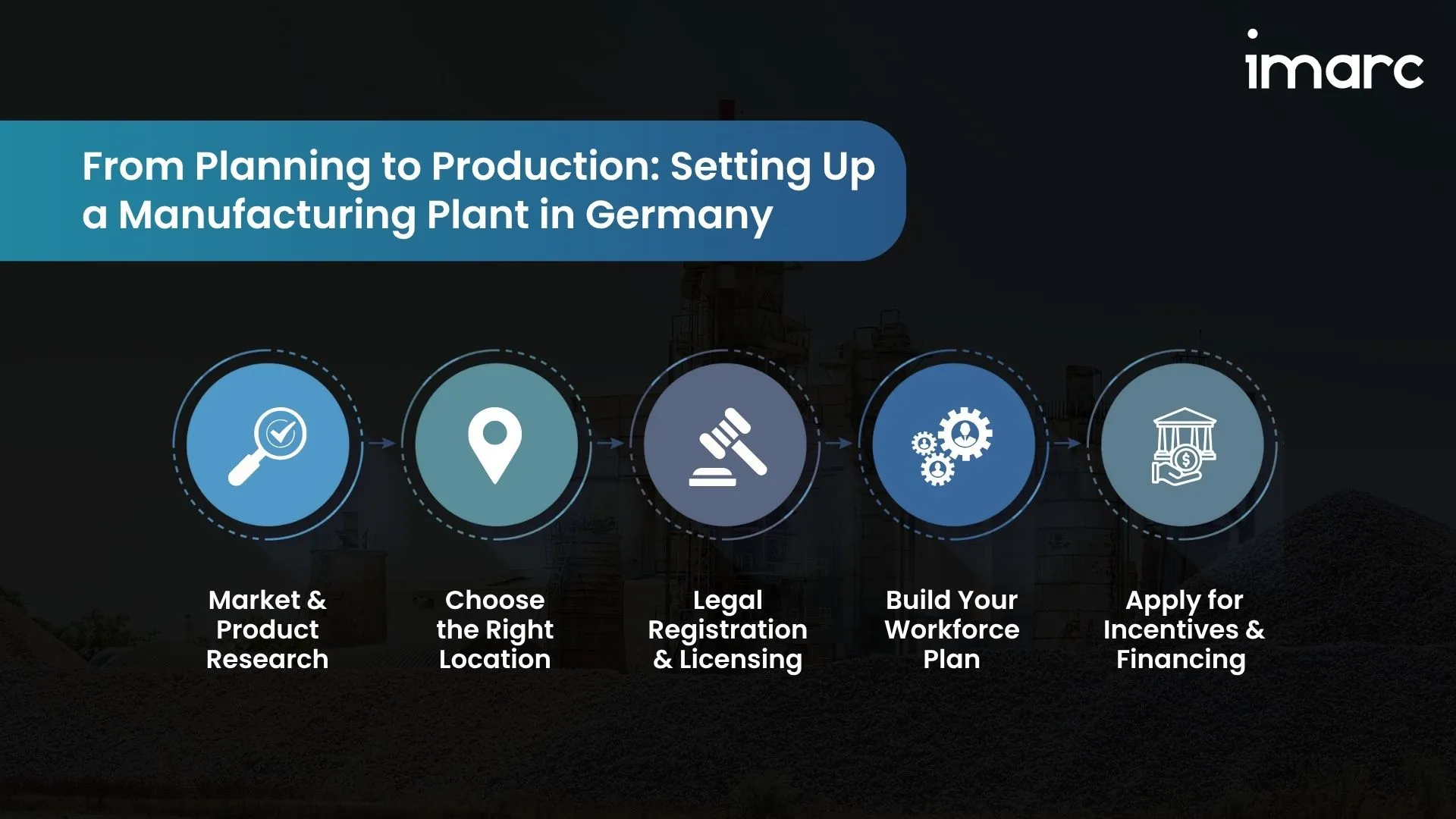How to Set Up a Manufacturing Plant in Germany: Key Steps and Insights

Initiating a manufacturing plant in Germany is a thrilling prospect to access one of the most cutting-edge and well-developed industrial markets in Europe. With its high-strength infrastructure, skilled workforce, and favorable government incentives, Germany has emerged as a prime location for advanced and high-tech manufacturing. But opening a plant in Germany needs cautious planning, rigorous research, precise legal compliance, and effective cost control. Transitioning from idea to running involves strategic moves, from finding the appropriate location, understanding regulations, and funding and legal backing. This manual will give you an overview of the process involved, the incentives one can access, and the considerations to make for a successful manufacturing facility in Germany.
Why Germany is the Ultimate Manufacturing Destination in Europe?
Germany's Strong Industrial Backbone and Innovation Drive
Germany has long been recognized as a global industrial leader, particularly in the automotive, machinery, and chemicals sectors. The country’s industrial base is further bolstered by the "Industrie 4.0" initiative, which promotes the integration of digital technologies and automation into manufacturing processes. This emphasis on innovation and advanced manufacturing makes Germany an attractive location for companies looking to invest in state-of-the-art facilities.
Strategic Location and Trade Networks
Germany's location in the heart of Europe gives manufacturers easy access to major international markets. It boasts the largest economy in Europe, making it a crucial hub for trade and commerce. The country is well-connected through its efficient road, rail, and port infrastructure, including Hamburg’s port. In May 2025, Germany’s new economy minister emphasized strengthening global trade relationships, further enhancing Germany's role as a central manufacturing and export hub.
Business-Friendly Policies That Benefit Foreign Investors
Germany offers an attractive business environment with favorable tax policies, well-established intellectual property protection, and various funding options for foreign investors. The country’s free trade agreements within the European Union help manufacturers reduce trade barriers. Aligned with this, in 2025, Germany's government unveiled a "New Energy Agenda," offering financial support and incentives to foster innovation, especially in sustainable energy technologies like fusion power.
Leading Industries Driving Germany’s Economy in Manufacturing:
• Automotive Manufacturing: Germany is the world leader in automotive production, with renowned brands like Volkswagen, BMW, and Mercedes-Benz. The automotive sector remains a key driver of industrial growth, particularly with the push toward electric vehicles and autonomous driving technologies.
• Mechanical Engineering and Automation: Known for its advanced machinery and equipment, Germany continues to lead in manufacturing industrial machinery and automation systems, with a focus on robotics, IoT, and smart manufacturing technologies.
• Chemicals and Pharmaceuticals: Germany is home to some of the world’s largest chemical and pharmaceutical companies. Its chemical industry is known for producing high-quality chemicals, plastics, and pharmaceutical products.
• Renewable Energy: Germany is a global leader in renewable energy, particularly in solar and wind power. The country is investing heavily in clean energy solutions, including the production of renewable energy systems and components.
• Food and Beverage Processing: Germany’s food industry continues to grow, with an increasing focus on organic and sustainable food production.
• Electronics and Semiconductors: As demand for electronics continues to rise, Germany is at the forefront of semiconductor manufacturing and the production of electronic components.
Top Benefits of Establishing a Manufacturing Facility in Germany:
-
Government Incentives and Financial Support
The German government offers various programs to attract and support manufacturers, including grants, loans, and tax incentives:
- Germany’s High-Tech Strategy: The government offers substantial funding for projects involving innovation and the development of advanced manufacturing technologies.
- Investment Grants and Loans: Organizations like the German Investment and Development Bank (KfW) provide low-interest loans and grants to manufacturing firms establishing themselves in Germany.
- Tax Incentives: Various local and federal tax incentives are available to companies involved in manufacturing, including investment grants for research and development projects.
- Energy Savings and Subsidies: Many regions in Germany offer favorable energy tariffs, particularly for high-energy sectors such as chemicals and metal manufacturing.
-
State-of-the-Art Infrastructure for Smooth Operations
Germany is known for its top-tier infrastructure, including an extensive transportation network of roads, railways, and airports. Its industrial zones are equipped with state-of-the-art utilities, ensuring that your facility will have reliable access to the power, water, and communication systems required for efficient operations.
-
Access to a Highly Skilled Workforce and Training Programs
Germany’s strong education and vocational training system ensures that businesses have access to a skilled workforce. The country has a long history of technical excellence, particularly in engineering, and is home to some of the best vocational training institutions in Europe. Moreover, Germany’s apprenticeship programs create a steady stream of highly skilled workers across various manufacturing industries.
-
Robust IP Protection and Legal Framework for Manufacturers
Germany offers one of the strongest intellectual property protection systems in the world. The country has well-established laws to protect patents, trademarks, and industrial designs, ensuring that proprietary technology and manufacturing processes remain secure. In April 2025, Germany’s government introduced a new IP strategy to support tech transfer and innovation, further strengthening its competitive edge in global markets. Companies can also leverage Germany’s legal infrastructure to establish robust contracts and partnerships with suppliers, distributors, and clients.
-
Domestic Demand and Export Potential
Germany’s strong domestic demand for manufactured goods, especially in sectors like automotive, engineering, and chemicals, provides stable growth opportunities for industry players. Additionally, Germany’s role as a key player in the EU’s single market provides significant export opportunities across Europe and to global markets, including the United States and Asia.
How Long It Takes to Build a Plant?
The timeline for setting up a manufacturing facility in Germany depends on various factors, including industry type, location, and scale.
• Standard Facilities (18–30 Months): For general manufacturing industries such as food and beverage or textiles, the setup typically takes between 18 and 30 months.
• Fast-Track Projects (12–18 Months): For smaller, pre-fabricated units or upgrades to existing facilities, the timeline can be shortened to 12–18 months.
• High-Tech or Heavy Industry (24–40 Months): For industries like automotive or chemical production, where large-scale facilities and specialized equipment are required, the timeline may extend to 24–40 months.
Challenges to Consider:
- Regulatory Complexity: Germany has a complex regulatory environment, and coordination between federal and local authorities may cause delays.
- High Setup Costs:Land acquisition and equipment installation can be expensive. Consider exploring government-backed industrial parks for subsidized rates.
- Skilled Workforce Availability:While Germany boasts a highly skilled workforce, certain specialized roles may require recruiting internationally.
- Intellectual Property Challenges:While IP protection is robust, it’s essential to actively monitor and defend your rights, particularly in highly competitive sectors.

From Planning to Production: Setting Up a Manufacturing Plant in Germany
-
Market and Product Research
Conduct in-depth research on the demand in Germany and the broader European market. Understand import/export trends, customs regulations, and competition. Utilize resources from the German Chamber of Commerce, the Ministry of Economy, and industry-specific trade bodies to evaluate market potential and industry-specific needs.
-
Choose the Right Location
Germany offers a range of locations for manufacturing setups, including industrial zones and business parks. Factors to consider when choosing a location include proximity to suppliers, access to major transportation hubs such as ports and airports. Locations near railways or highways can provide additional logistical advantages.
Key factors to consider:
- Proximity to raw materials and suppliers
- Access to major transportation hubs (ports, railways, airports)
- Reliable utility services and cost-effectiveness
- Zoning laws and compliance with environmental and safety standards
-
Legal Registration and Licensing
Register your business with the German Trade Register and ensure that you acquire all necessary trade and industrial licenses. This will also include obtaining environmental permits, construction approvals, and meeting production regulations.
Key permits needed:
- Trade license
- Industrial license
- Environmental approval from local municipalities
- Employment and visa permits for foreign workers, if needed
-
Build Your Workforce Plan
Germany is known for its highly skilled workforce, but you may need to recruit specific talent based on your plant's needs. Work with vocational schools, universities, and recruitment agencies to find skilled professionals.
Considerations:
- Hiring local talent from vocational training programs
- Recruiting international workers, if necessary
- Aligning with Germany's labor laws and employment standards
-
Apply for Incentives and Financing
Germany provides financial support for businesses setting up manufacturing facilities through various government programs. Work with regional development agencies and financial institutions, such as the German Investment and Development Bank (KfW), to secure funding, low-interest loans, grants for innovation.
Opportunities include:
- Low-interest loans and grants for R&D
- Energy efficiency subsidies
- Government support for green manufacturing initiatives
-
Design, Build, and Equip the Facility
Design your facility layout according to the production requirements and ensure it meets Germany’s stringent safety and environmental standards. The German market has been moving toward Industry 4.0, so integrating ERP systems, IoT devices, and AI-powered predictive maintenance will streamline your operations and enhance efficiency.
Considerations:
- Purchase and installation of machinery
- Integration of smart factory solutions, including IoT and AI
- Ensuring compliance with safety and environmental regulations
How IMARC Supports Manufacturing Expansion in Germany
IMARC helps businesses navigate the complexities of establishing a manufacturing plant in Germany. From detailed market research to cost estimation, site selection, and regulatory compliance, IMARC provides the strategic support necessary for success.
IMARC Offers:
- Detailed analysis of demand trends, competition, and strategic product positioning.
- Market feasibility, cost estimates, and location evaluation for optimal logistics and labor.
- Identifying ideal sites with access to suppliers, transport hubs, and skilled labor.
- Accurate cost breakdowns and funding projections.
- Navigating local and EU regulations, securing permits, and ensuring compliance.
Germany offers a highly attractive environment for manufacturing, with strong infrastructure, government support, and access to skilled labor. However, the process of setting up a plant requires careful planning, legal compliance, and strategic decision-making.
With expert support, businesses can successfully navigate the challenges and position themselves for long-term success in Germany’s competitive industrial market. Contact IMARC today to begin your manufacturing journey in Germany.
Our Clients
Contact Us
Have a question or need assistance?
Please complete the form with your inquiry or reach out to us at
Phone Number
+91-120-433-0800+1-201-971-6302
+44-753-714-6104










